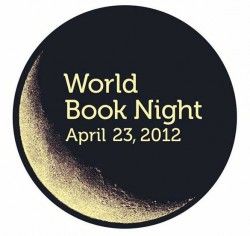World Book Night Was An Opportunity To Share My Love For Books

“Books are the perfect entertainment: no commercials, no batteries, and hours of enjoyment for each dollar spent.” — Stephen King
BETWEEN THE LINES: That statement sums up my love of books. But, I write this not to praise the prolific, best-selling author, but to extol the joy of reading that has given me untold hours of pleasure.
Reading is my favorite leisure time diversion. A rock and roll enthusiast since I first heard Elvis Presley in my youth, I’ve enjoyed books even longer. While rock music may energize my spirit, opening a new book with its just-printed scent and crisp, yet fragile, pages stimulates my mind from the opening sentence that transports me to unexplored worlds.
To help broaden my passion for books and reading to others, I volunteered to be a “book giver” on April 23, which was designated the second annual World Book Night. The event is the brainchild of a Scottish book publisher, who kicked it off last year in Ireland and the United Kingdom, to spread a love of reading and books. (I’m still not clear why the word “night” is used, as opposed to “day,” so, from here, I will refer to the event as World Book Day [or WBD]).
On World Book Day, held this year for the first time in the U.S., I was pleased to be part of an international event that distributed more than two million free books across the UK, Ireland, and Germany, including one million in the U.S.
I jumped at the chance to participate several months ago when I spotted a notice posted on Facebook that the organization needed volunteers for the early spring distribution.
My mission was to hand out copies of a specially printed edition of a paperback I picked from a list of 30 books, selected by a panel of booksellers and librarians that included diverse best-sellers like Maya Angelou’s I Know Why Caged Birds Sing, The Stand by Stephen King, The Hunger Games by Suzanne Collins, The Kite Runner by Khaled Hosseini and Alice Sebold’s The Lovely Bones. Participants received more than a dozen copies of one of their top three selections. Two books that I had read from the list were my first two choices, but I ended up with my third option, Peace Like A River, an acclaimed 2001 novel that I’d never read.
It was recommended that I distribute the books to “light and non-readers,” but without a clue as to what location would best fulfill that constraint, I opted for the Brooklyn Public Library branch in Gerritsen Beach. Before handing the book to someone, I asked them a few questions about their reading habits. Following brief conversations, I gave them to individuals who I felt would most enjoy the free gift.
A few people admitted they were light readers (after all, they were at the library), but after we talked about the authors and the books they liked, I felt they were worthy of the free paperback.
Naturally, most people take anything for free, but one woman seemed hesitant then questioned me. She inquired about whether or not the book had any religious overtones. Having only read 50 pages at that point, I admitted there was a character with religious inclinations, so she refused the book. I was puzzled, but assumed she thought I was a member of a cult or religious faction, like Jehovah’s Witnesses, trying to “spread the word” and proselytize through free materials.
I got into a lengthy discussion on books versus e-readers with a man about my age. Like me, he also has an aversion to electronic books. While we both understand the rapid changes brought on by modern technology and the growing popularity of electronic reading gadgets, especially among the younger generation, we agreed that we prefer holding a book and turning the pages and that it was unlikely we’d ever convert or quit reading in the traditional format.
Call me old-fashioned, unhip, conventional, but when it comes to books I prefer the feel of it in my hands. When you pick up a book for the first time, you enter a world that can take you to places and times that stir the imagination and seem as fresh as the day the words were committed to the blank page.
While I always encourage reading by children and adults, I hope the future of books and publishing is not solely relegated to words on a hand-held electronic screen.
It’s recommended that to become a better writer, one should read more. However, writing well, as I continue to discover as a writer and editor, is harder than most people realize. Anyone can write – or think they can – but not everyone’s a writer.
All books are not great literature, nor do they have to be. A book only has to offer a story that captivates the individual reader, who is rewarded with a brief escape to other times and places.
When it comes to reading, fiction or non-fiction, the book gets my undivided attention. When I read for an hour or so, I become absorbed in the narrative flow as my imagination envisions the characters and locations and outside disruptions are typically ignored.
I was bitten by the reading bug as a child and it has since provided me with an irresistible love of books and reading, which is not just to pass time. Books make you think. They make you laugh or cry and they always teach. It always makes sense to book some time to read a book.
What kind of reading do you do?
Neil S. Friedman is a veteran reporter and photographer, and spent 15 years as an editor for a Brooklyn weekly newspaper. He also did public relations work for Showtime, The Rolling Stones and Michael Jackson. Friedman contributes a weekly column called “Between the Lines” on life, culture and politics in Sheepshead Bay.




